What is feline herpesvirus (FHV)?
The feline herpesvirus is a virus that infects the majority of cats, both domestic and wild. Once infected with this virus, cats commonly develop upper respiratory infections and/or eye diseases.
Also known as ‘cat flu’ or feline viral rhinotracheitis, “FVR is a major cause of upper respiratory disease in cats, and is the most common cause of conjunctivitis (inflammation of the tissues surrounding the eye, especially the lining of the lids and the third eyelid),” according to veterinarians, Dr. Krista Williams and Dr. Cheryl Yuill.
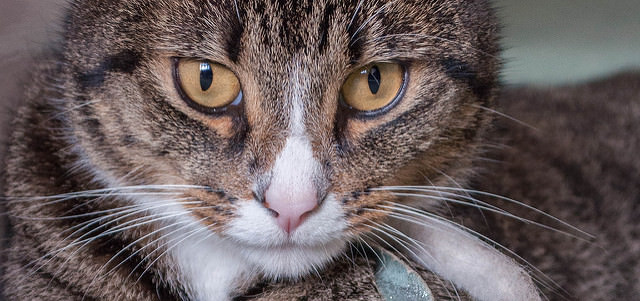
Image Source: Caroline Granycome via Flickr
#1 – Feline Herpes Often Mistaken for Common Cold
The symptoms of feline herpesvirus infection can range depending on how the virus affects the cat. Many of the symptoms an FHV-borne illness mimic those of a common cold, leading cat parents to dismiss the illness as nothing serious. Some symptoms of feline herpes infections also involve the eyes, causing issues like conjunctivitis and ocular ulcers.
Upper Respiratory Infection Symptoms
Dr. Cheryl Yuill reports upper respiratory infections in cats generally last 1-3 weeks when the case presents without complications. “The typical upper respiratory infection involves the nose and throat, causing symptoms such as”:
- Sneezing
- Nasal congestion and breathing difficulties
- Eye discharge
- Mouth ulcers
- Loss of appetite
- Lack of energy
- Fever
Conjunctivitis
Feline herpes is a leading causes of eye infections in cats. Dr. Ernest Ward lists symptoms of eye infections in cats as:
- Squinting or closing eyes
- Redness
- Swelling
- Eye discharge ranging in color from “clear to yellow-greenish”
Eye Ulcers
In addition to nasal symptoms and eye infections, FHV can cause painful ulcers in the cornea of a cat’s eye. Corneal ulcers present with symptoms similar to those of eye infections, but cat parents may see a ‘clouding’ or ‘film’ in the cat’s eyes. Ruptures and indentions in the cornea may be visible as well.
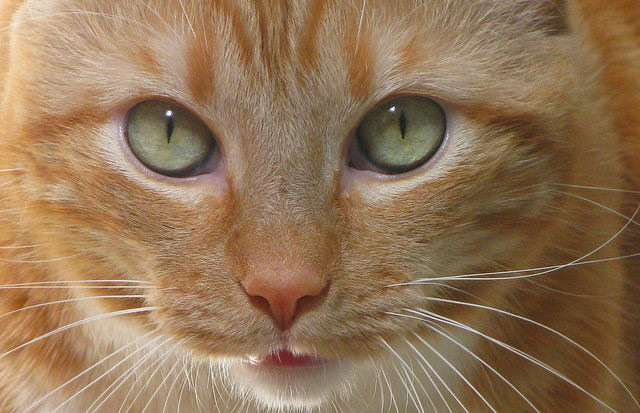
Image Source: miheco via Flickr
While being infected with feline herpesvirus isn’t fatal to a cat, the illnesses that arise from an active virus can lead to severe symptoms. Whether nasal or ocular, if your cat develops any of the above symptoms, please contact the vet.
#2 – Feline Herpesvirus is Contagious in Cats
Feline herpesvirus is very contagious, spreading fast through homes with more than one cat, animal shelters, and catteries. The virus spreads from cat to cat by direct contact with saliva as well as eye and nasal secretions, and also through the “inhalation of sneeze droplets.” FHV can also spread to other cats from sharing litter boxes and food dishes with an infected cat.
And while most cats will be exposed to the feline herpesvirus at some point in their life, cat parents can help minimize the spread by separating an ill cat from other cats. Separate litter pans and dishes will be necessary as well as a thorough cleaning of the house. “The virus prefers damp environments but even so, can only remain active for 18 hours on a surface without a host and an even shorter period of time as an aerosol.”
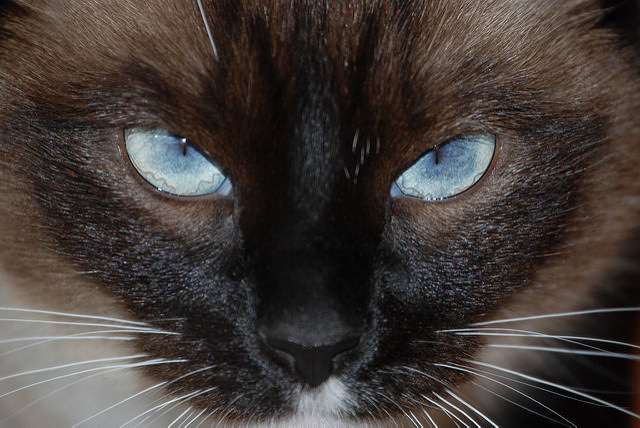
Image Source: Laura McFaddin via Flickr
#3 – FHV Not Contagious to Humans or Dogs
Is feline herpesvirus contagious to humans?
Can dogs be infected by FHV?
Knowing cats can spread the virus amongst each other, fur parents might worry over whether or not feline herpesvirus is contagious to them or the pup. But rest assured, humans and dogs cannot contract feline herpesvirus.
“Feline herpes virus is specific to cats. In fact, most mammals have their own type of herpes virus. These viruses will not infect other species,” according to the medical staff at Upstate Veterinary Specialties.
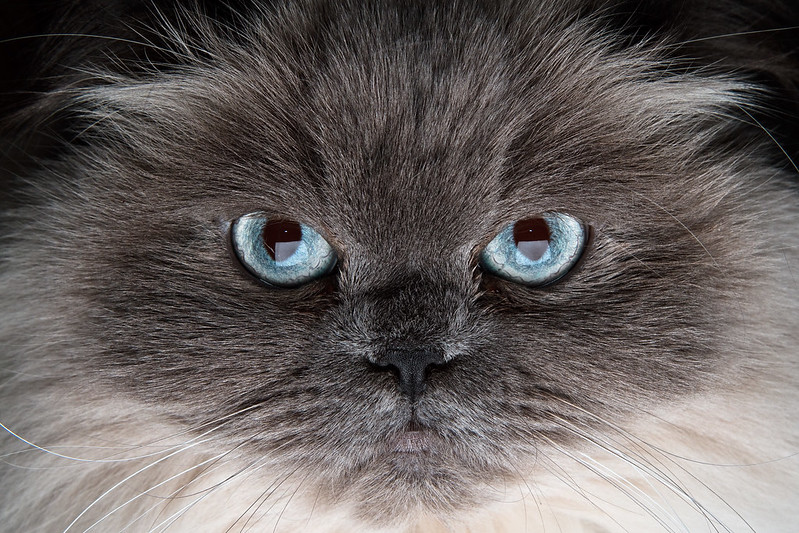 Image Source: Etienne Tremblay via Flickr
Image Source: Etienne Tremblay via Flickr
#4 – Some FHV Carriers Never Suffer Symptoms
Once a cat has been exposed to the virus, whether or not they fall ill, the cat becomes a carrier. Meaning the virus remains inside the cat’s body, but is not actively shedding or sickening the animal. Basically, the herpesvirus is sleeping in the cat’s body.
Cats usually show signs of illness when they are shedding the active virus, but not in all cases. As this time, cats around the sick cat can be infected.
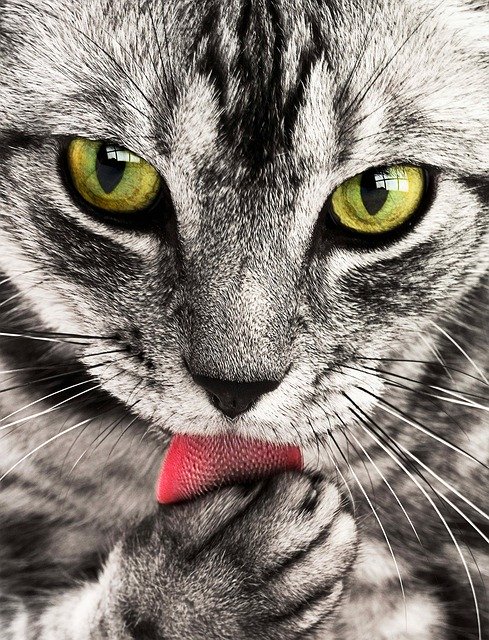
Some cats carry the feline herpesvirus, but never get sick.
#5 – Some Cats Face Higher Risk of Feline Herpesvirus Infection
All cats are at risk for feline herpes infection but Wendy Brooks, DVM, DABVP, explains some cats are more susceptible:
- Cats with weakened immune systems from such diseases as FIV, FeLV, and FIP
- Kittens, as their immune systems are still developing
- Outdoor cats
- Cats in shelters, catteries, or anywhere multiple cats coexist
- Persian cats as well as other breeds with flat facial features
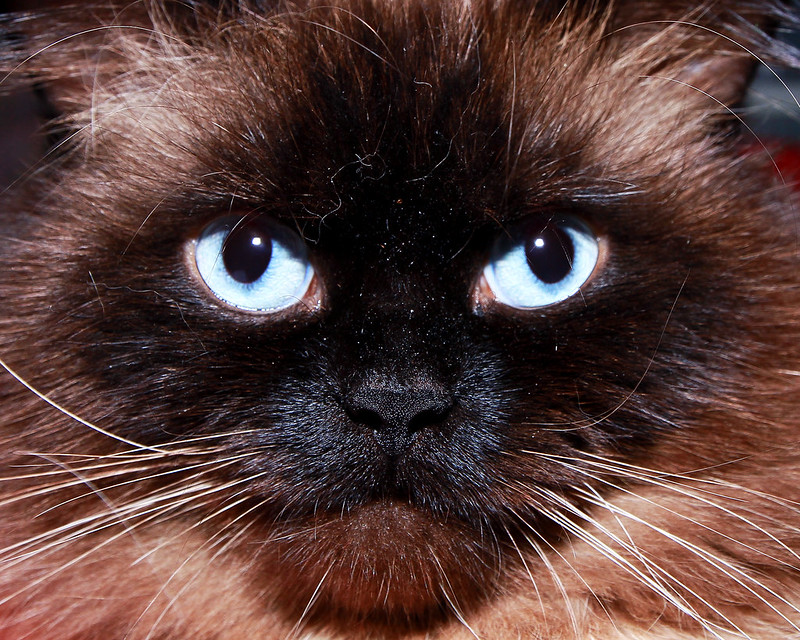 Image Source: Joseph Morris via Flickr
Image Source: Joseph Morris via Flickr
#6 – Symptoms Treatable, but FHV Infection Not ‘Curable’
Once a cat has contracted the feline herpesvirus, they will likely carry the virus for life. While the symptoms of FHV illnesses, like upper respiratory and eye infections, can be treated until they disappear, cats are rarely cured of the herpesvirus as it lies dominant in the body.
FHV can reactivate if cats find themselves in high stress or low immunity situations. The virus reactivates by invading and taking control “over another cell in order to reproduce.”
Cat parents can help avoid these flare-ups by keeping the home calm and stress free. Staying on top of veterinary care will keep your cat in tiptop shape so low immunity situations which put cats at risk for reactivation can be more easily avoided.
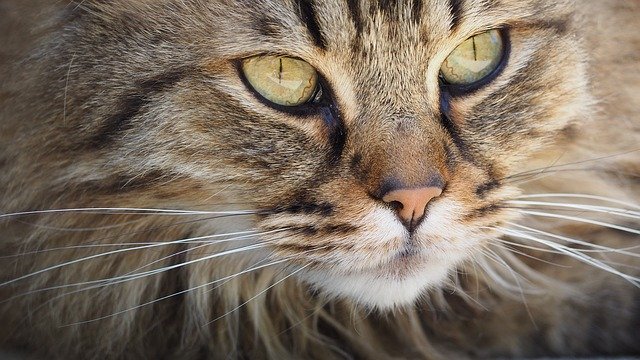
Feline herpesvirus can cause upper respiratory infections and eye problems.
If your cat is experiencing a bout of active virus and feeling ill, the vet may run tests to confirm the cause of the URI or conjunctivitis as FHV. After collecting a nasal or throat swab and FHV is diagnosed, the vet will treat cats with antivirals as well as by symptoms. Congestion medication and breathing treatments help relieve stuffy noses. Topical creams or eye drops are typically prescribed for conjunctivitis or ulcers.
Probiotics and supplements can also help shorten the duration of symptoms. Amino acid L-lysine “may help reduce the severity of the disease as well as decreasing spread of the infection.”
Be aware, severe cases could result in overnight hospitalization, in which IV fluids and oxygen administration will likely occur.
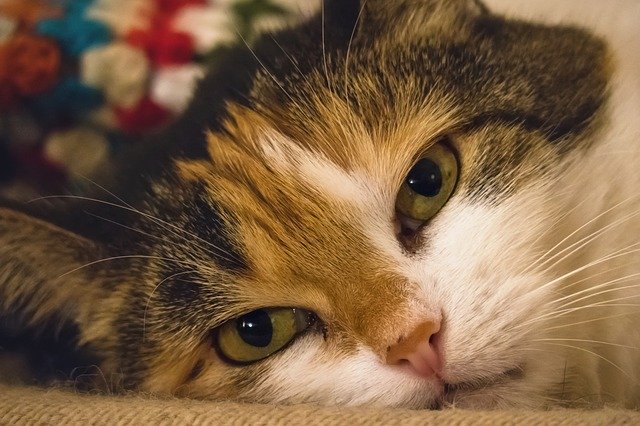
Active feline herpesvirus can cause illness in cats.
The European Advisory Board on Cat Diseases offers a couple of ideas on how to keep your sick cat comfortable during FHV illness:
- Offering your sick baby “tender loving care” is a must. Cater to his or her every whim.
- Cats without appetite “should be fed blended, highly palatable food – warmed up if required.”
- Bring the water dish to your cat. Offer sips every so often to be sure dehydration does not become an issue.
- Allow plenty of time for rest. Sleep is one of the best medicines!
#7 – Vaccination Protocols Lower Risk of Severity
Following vaccination protocols for cats is important, not just for FHV, but for the prevention of many other common cat illnesses as well.
International Cat Care recommends, “Two or three injections are recommended in kittens, starting at around 8 weeks of age. Cats should receive a booster at a year of age, and after that should receive further booster vaccines every 1–3 years.”
But something to remember when it comes to the vaccine for feline herpesvirus. “Vaccination does not necessarily prevent infection with FHV but will greatly reduce the severity of clinical disease.” Which in itself means the vaccination is well worth it for the sake of your kitty darling!
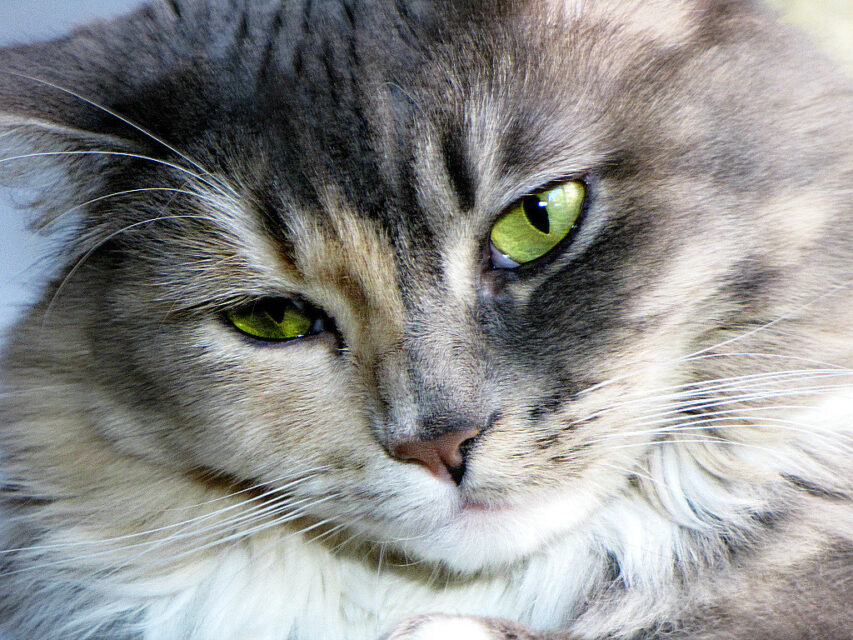
Image Source: Trish Hamme via Flickr
Most cats carry the feline herpesvirus and have probably been sickened by it at some point. Flareups can occur, but by keeping to a regular veterinary care routine and knowing your cat, you can help your cat through any symptoms that arise.
Remember, your cat always needs you, even if she acts aloof sometimes. But when your kitty isn’t feeling good, she needs you all the more.
Feature Image: Image Source: Etienne Tremblay via Flickr
